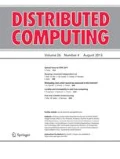Abstract
Ability to cooperate on common tasks in a distributed setting is key to solving a broad range of computation problems ranging from distributed search such as SETI to distributed simulation and multi-agent collaboration. In such settings there exists a trade-off between computation and communication: both resources must be managed to decrease redundant computation and to ensure efficient computational progress. This paper deals with scheduling issues for distributed collaboration. Specifically, we examine the extreme situation where initially collaboration must occur without communication. That is, we consider the extent to which efficient collaboration is possible if all resources are directed to computation at the expense of communication. The results summarized here precisely characterize the ability of distributed agents to collaborate on a known collection of independent tasks by means of local scheduling decisions that require no communication and that achieve low redundancy in task executions. Such scheduling solutions exhibit an interesting connection between the distributed collaboration problem and the design theory. The lower bounds presented here along with the randomized and deterministic schedule constructions show the limitations on such low-redundancy cooperation and show that schedules with near-optimal redundancy can be efficiently constructed by processors working in isolation.
Similar content being viewed by others
References
Dolev, S., Segala, R., Shvartsman, A.A.: Dynamic load balancing with group communication. In: Proceedings of Intl Colloquium on Structural Information and Communication Complexity, pp. 111–125 (1999)
Dolev, D., Malki, D.: The transis approach to high availability cluster communications. Commun. ACM 39(4), 64–70 (1996)
Korpela, E., Werthimer, D., Anderson, D., Cobb, J., Lebofsky, M.: SETI@home: Massively distributed computing for SETI. In: Dubois, P.F. (ed.) Computing in Science and Engineering. IEEE Computer Society Press, Los Alamitos, CA (2000)
Kondo, D., Casanova, H., Wing, E., Berman, F.: Models and scheduling guidelines for global computing applications. In: proceedings of International Parallel and Distributed Processing Symposium, p. 79 (2002)
Papadimitriou, C.H., Yannakakis, M.: On the value of information in distributed decision-making. In: Proceedings of ACM Symposium on Principles of Distibuted Computing, pp. 61–64 (1991)
Georgiades, S., Mavronicolas, M., Spirakis, P.: Optimal, distributed decision-making: The case of no communication. In: Proceedings of International Symposium on Fundamentals of Computation Theory, pp. 293–303 (1999)
Georgiou, Ch., Russell, A., Shvartsman, A.: Work-competitive scheduling for cooperative computing with dynamic groups. SIAM J. Comput. 34(4), 848–862 (2005)
Hughes, D.R., Piper, F.C.: Design Theory. Cambridge University Press, New York (1985)
Alon, N., Spencer, J.H.: The Probabilistic Method. Wiley, New York (1992). With an Appendix by Paul Erdős, Wiley-Interscience
Hoeffding, W.: Probability inequalities for sums of bounded random variables. J. Am. Stat. Assoc. 58, 13–30 (1963)
Azuma, K.: Weighted sums of certain dependent random variables. Tôhoku Math. J. 19(2), 357–367 (1967)
Johnson, S.M.: A new upper bound for error-correcting codes. IEEE Trans. Inf. Theor. 8, 203–207 (1962)
Dudley, R.M.: Real Analysis and Probability. Wadsworth & Brooks/Cole Advanced Books & Software. Pacific Grove (1989)
Harary, F.: Graph Theory. Addison-Wesley, Reading, MA (1994)
Hopcroft, J.E., Karp., R.M.: A O(n5/2) algorithm for maximum matching in bipartite graphs. SIAM J. Comput. 2(4), 225–231 (1973)
Malewicz, G.: Distributed scheduling for disconnected cooperation. Doctoral Dissertation, University of Connecticut (2003)
Morgan, J.P., Preece, D.A., Rees, D.H.: Nested balanced incomplete block designs. Discrete Math. 231, 351–389 (2001)
Malewicz, G.: Latin squares with bounded size of row prefix intersections. Discrete Applied Math. (2004)
Denes, J., Keedwell, A.D.: Latin Squares and their Applications. Academic, New York (1974)
Malewicz, G.: Toward a theory of avalanche-creating and error-controlling encoding schemes. In: Proceedings of IEEE International Symposium on Information Theory (ISIT’05), pp. 2394–2398 (2005)
Dwork, C., Halpern, J., Waarts, O.: Performing work efficiently in the presence of faults. SIAM J. Comput. 27(5), 1457–1491 (1998)
Malewicz, G., Russell, A., Shvartsman, A.: Local scheduling for distributed cooperation. In: Proceedings of IEEE International Symposium on Network Computing and Applications, NCA’01, pp. 244–255 (2001)
Malewicz, G., Russell, A., Shvartsman, A.A.: Optimal scheduling for disconnected cooperation. In: Proceedings of 8th International Colloquium on Structural Information and Communication Complexity (2001) (also see brief announcement in PODC’01)
Malewicz, G., Russell, A., Shvartsman, A.A.: Distributed cooperation during the absence of communication. In: Proceedings of 14th International Conference on Distributed Computing, LNCS, vol. 1914, pp. 119–133 (2000) (also see brief announcement in PODC’00)
Author information
Authors and Affiliations
Corresponding author
Additional information
The work of G. Malewicz was done when he was a Ph.D. student at the University of Connecticut, and in part during a visit to the Specification and Algorithm Research Department, AT&T Shannon Lab, and the Supercomputing Technologies Group, Massachusetts Institute of Technology.
Parts of this article appeared in a preliminary form in the Proceedings of the 14th International Symposium on Distributed Computing [24], Springer LNCS Vol. 1914, pp. 119–133, in the Proceedings of the 8th International Colloquium on Structural Information and Communication Complexity [23], and the doctoral thesis of the first author.
Rights and permissions
About this article
Cite this article
Malewicz, G., Russell, A. & Shvartsman, A.A. Distributed scheduling for disconnected cooperation. Distrib. Comput. 18, 409–420 (2006). https://doi.org/10.1007/s00446-005-0149-0
Received:
Accepted:
Published:
Issue Date:
DOI: https://doi.org/10.1007/s00446-005-0149-0




